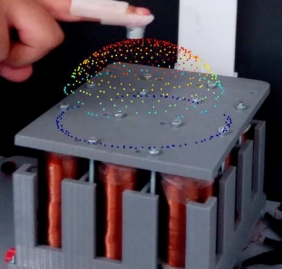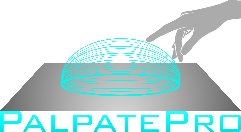
PalPatePro
Haptic mid-air force feedback & VR/AR technology, which creates a lifelike training simulator. HIT launched the PalpatPro project to develop a training simulator to improve palpation skills for medical students and nurses in training.
Breast cancer is the most common form of cancer among women in the Netherlands, with approximately 18,000 diagnoses each year. Surgery, radiation therapy, and chemotherapy are key treatment options, but the success rate of these interventions increases with early diagnosis. The Netherlands has a breast cancer screening program for this purpose. For younger women, who do not yet receive an invitation for screening, diagnosis often occurs through discovering a “lump in the breast.” Detecting this through external palpation of the breast is therefore crucial. Palpation also plays an important role in further diagnosis and treatment planning.
 Diagnosing through palpation is complex and requires extensive training. Typically, such training takes place using dummy breasts or mannequins, or in some cases, real patients if the situation allows. However, dummy breasts provide only one or a few scenarios, making the training very limited. Research shows that mastering such a skill requires a great deal of experience. Practicing on real patients offers various scenarios but does not allow room for mistakes, which is also part of skill development. The risk that arises from this is that medical professionals may not always be adequately trained in recognizing breast cancer. Therefore, there is a strong need for medically realistic simulators, as identified by the Dutch Federation of University Medical Centers.
Diagnosing through palpation is complex and requires extensive training. Typically, such training takes place using dummy breasts or mannequins, or in some cases, real patients if the situation allows. However, dummy breasts provide only one or a few scenarios, making the training very limited. Research shows that mastering such a skill requires a great deal of experience. Practicing on real patients offers various scenarios but does not allow room for mistakes, which is also part of skill development. The risk that arises from this is that medical professionals may not always be adequately trained in recognizing breast cancer. Therefore, there is a strong need for medically realistic simulators, as identified by the Dutch Federation of University Medical Centers.
In this project, HIT is collaborating with the Overijssel-based startup HapMag, which has developed a new concept based on “mid-air haptics.” This technology allows virtual objects to be felt without physical contact. The consortium sees an opportunity in this technology to develop a highly accurate training tool for medical personnel in training. Such a tool would enable intensive practice of diagnostic skills on virtual patients, ensuring that these skills are already developed when interacting with real patients. This technology contributes to better healthcare and the reduction of breast cancer mortality in the Netherlands. It also holds great potential for other medical diagnoses and procedures.
With PalpatPro, HIT aims to reduce the number of patients who die from breast cancer by ensuring it is detected more often and earlier, while also improving the experience for patients undergoing such examinations. Additionally, the system could be used by hospitals or general practitioners to train women in recognizing breast cancer at an early stage (self-examination).
